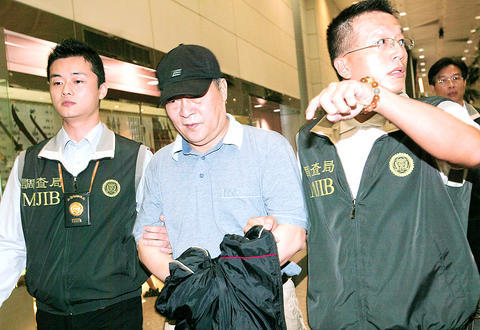Former Chinese Nationalist Party (KMT) legislator Chang Wen-yi (張文儀), who has been on the wanted list since December 2004 on charges of fraud, was repatriated from Macau yesterday, officials from the Ministry of Justices' Investigation Bureau said yesterday.
Chang, accompanied by bureau officials, arrived at Taiwan Taoyuan International Airport yesterday afternoon and was taken to a jail in Taichung, a bureau statement said.
COLLUSION

PHOTO: CNA
In September 2004, Chang received a one-year sentence for colluding with former Kuangsan Enterprise Group (廣三集團) president and former Taichung Business Bank (台中企銀) board chairman Tseng Cheng-jen (曾正仁) in an insider trading case.
Chang fled to China in August 2004 and was put on the wanted list that December.
Bureau officials said that Chang was believed to have been staying in Shanghai, where he allegedly made investments in and ran plasticware and footwear manufacturing plants.
Officials at the bureau tracked Chang as he was leaving from Shanghai for Macau, the statement said.
COOPERATION
After the agents informed Macau security authorities of the fugitive, local enforcement officials arrested him in the territory.
The bureau said that Macau authorities agreed to repatriate Chang in accordance with the Kinmen Accord.
Struck in 1990, the Kinmen Accord is a mechanism by which cross-strait illegal immigrants and criminals can be returned to their point of origin.
TRANSACTIONS
Chang and Tseng were involved in illegal stock transactions worth more than NT$8.4 billion (US$254 million) in 1997 while Chang served as chairman of a Kuangsan Enterprise Group subsidiary.
He was charged with violating the Securities Transaction Law (
Tseng was sentenced to 11 years in 2004 for embezzlement and other scandals before he fled to China.

CHAOS: Iranians took to the streets playing celebratory music after reports of Khamenei’s death on Saturday, while mourners also gathered in Tehran yesterday Iranian Supreme Leader Ayatollah Ali Khamenei was killed in a major attack on Iran launched by Israel and the US, throwing the future of the Islamic republic into doubt and raising the risk of regional instability. Iranian state television and the state-run IRNA news agency announced the 86-year-old’s death early yesterday. US President Donald Trump said it gave Iranians their “greatest chance” to “take back” their country. The announcements came after a joint US and Israeli aerial bombardment that targeted Iranian military and governmental sites. Trump said the “heavy and pinpoint bombing” would continue through the week or as long

TRUST: The KMT said it respected the US’ timing and considerations, and hoped it would continue to honor its commitments to helping Taiwan bolster its defenses and deterrence US President Donald Trump is delaying a multibillion-dollar arms sale to Taiwan to ensure his visit to Beijing is successful, a New York Times report said. The weapons sales package has stalled in the US Department of State, the report said, citing US officials it did not identify. The White House has told agencies not to push forward ahead of Trump’s meeting with Chinese President Xi Jinping (習近平), it said. The two last month held a phone call to discuss trade and geopolitical flashpoints ahead of the summit. Xi raised the Taiwan issue and urged the US to handle arms sales to

State-run CPC Corp, Taiwan (CPC, 台灣中油) yesterday said that it had confirmed on Saturday night with its liquefied natural gas (LNG) and crude oil suppliers that shipments are proceeding as scheduled and that domestic supplies remain unaffected. The CPC yesterday announced the gasoline and diesel prices will rise by NT$0.2 and NT$0.4 per liter, respectively, starting Monday, citing Middle East tensions and blizzards in the eastern United States. CPC also iterated it has been reducing the proportion of crude oil imports from the Middle East and diversifying its supply sources in the past few years in response to geopolitical risks, expanding

OTHER OPTIONS: Given possible US intervention and Taiwanese counterattacks, China might opt to blockade Taiwan or take its outlying islands instead of an all-out invasion A US think tank has urged Taiwan to adopt a “hellscape” strategy that would flood the Taiwan Strait with drones and other uncrewed systems to deter invasion by China. In its report, Hellscape for Taiwan, published on Thursday, the Center for a New American Security said Taipei’s asymmetric defense approach — often described as a “porcupine strategy” — needs to evolve to keep pace with the growing capabilities of the Chinese People’s Liberation Army. The “hellscape” strategy involves saturating the air and waters around Taiwan with thousands of drones and other platforms capable of striking invading forces from multiple domains at once. Long-range